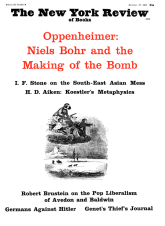In response to:
Temptations of the Cultural Historian from the November 19, 1964 issue
To the Editors:
Marius Bewley’s statement in the November 19th issue that Burckhardt’s Griechische Kulturegeschichte was “recently translated into English for the first time” requires elaboration. The translation omits two of the four volumes altogether and abridges the other two savagely. Neither the surviving collection of fragments nor the quality of the translation is likely to help a reader understand how Professor Bewley could possibly have called the work “a masterpiece of cultural history.”
M. I. Finley
Cambridge, England
Marius Bewley replies:
Mr. Finley is referring to two sentences of mine only on Jacob Burckhardt in a review I wrote of a volume of American cultural history. As I had no intention of reviewing Burckhardt, the information Mr. Finley cites in his letter continues to appear inappropriate to me for inclusion in a review of another book on a subject rather remote from Greek culture. This seems especially true as the facts quoted by Mr. Finley are given prominence in the translation from the German—once on the reverse of the title page and, more fully, in an opening note.
On the basis of his letter, I assume that Mr. Finley’s objections extend beyond the translation to the work itself, and I would guess that, if he were more explicit, they would resemble those of the recent reviewer of History of Greek Culture in the Times Literary Supplement. I personally prefer an opinion expressed in 1948 by Professor Moses Hadas:
Fifty years ago, when Burckhardt’s great work on Greek civilization appeared posthumously, professional scholars expressed regret that the work had been published, on the ground that its material was already obsolete. It is true that many aspects of Burckhardt’s subjects have received new illumination by detailed researches into administration, economics, and religion that have been carried out in the interval, but it is also true not only that Burckhardt has survived his critics of half a century ago but that his insight and his skill may still afford the lay reader a truer and more meaningful picture than can the production of contemporary professional historians.
This Issue
December 17, 1964



